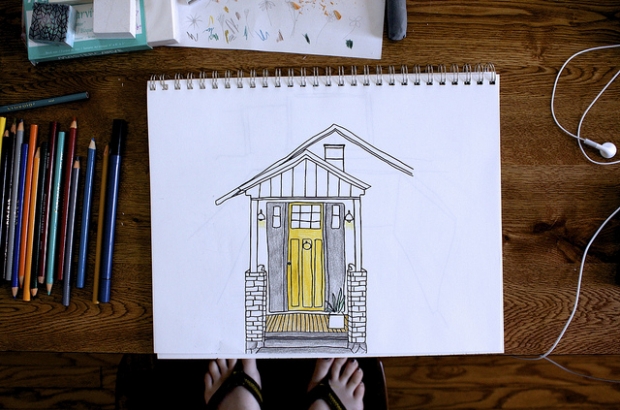- Daily & Weekly newsletters
- Buy & download The Bulletin
- Comment on our articles
Extreme Home Makeover: Belgian Edition
It’s been on your mind for a while, or even something you've been meaning to do since you bought the place: you want to renovate your house or apartment.
Like in most countries, making improvements to your home is not a simple (and definitely not a quick) task, especially when you’re dealing with multiple regional regulations and languages. So before you start putting holes in the wall, learn about the essential steps involved in giving your piece of real estate a face-lift.
Note: most websites referenced here are in French or Dutch, so have a web translator on hand if needed.
Drawing up the plans
What exactly do you mean when you say you want to 'renovate'? Do you simply want to put on a new coat of paint, or tear down the right side of the house? Some renovations will be cheaper and easier than others, so it is important to have a firm idea of what you want before taking the next steps.
Some initial questions to ask:
Is your renovation realistic?
Building up and out in cities likes Brussels is highly regulated; before renovating your house, you must send your plans or blueprints to your commune for approval and a permit (permis d’urbanisme). As these permits take a long time to acquire, you want to make sure your plan is in perfect harmony with Belgian law by checking up on Brussels planning permit regulations.
Are there renovation alternatives?
There are many ways to go about renovating a house, so keep an open mind around your reconstruction options. 'Why' is a key point to think about, as well as climate (especially if you have moved to a country with a different climate to what you are used to).
Do you have time (and patience)?
Renovation work can take much longer than one expects. So make sure that you set aside a lot of time and patience for the whole affair. Even if you don't have a strict construction deadline, ensure that you pace yourself and set goals in order to see some signs of improvement either daily or weekly.
What is your budget?
How much are you prepared to put into this renovation project? Are you prepared to go a little over budget? Make sure you have done your research and sums on your finances, and have looked into the possible subsidies you can receive for your project (see below under "Foot a part of the bill to Belgium").
Getting help
Are you breaking out in hives just after reading these preliminary questions? Don't worry, you'll have help: in Belgium like anywhere it is common practice to employ an architect and renovation experts for the work.
As soon as you have a concrete idea of your makeover plans, here is a list of renovation VIPs you will want to contact.
Renovation VIPS:
Architect: The architect is the ringleader of your renovation work. Not only does he gather all the necessary documentation (plans, costs, regulations), but he also works in close collaboration with the other renovation intermediaries (contractors, insurance). Having a good architect is the key to a successful renovation project. To find a certified and recommended archtitect, try Construction Quality’s search engine (allows to search by type of construction project and postcode).
Do you need an architect? Not always. For example, interior work that does not change the volume, edifice or affect the stability of the real estate in question is allowed. Also, putting on solar panels or antennas does not require an architect. See the full list here.
Contractor: Contractors execute your renovation and construction work. In Belgium, you can hire a general contractor who will execute the entire construction project, or employ several contractors to execute the different construction work. The first is better for those with less time while the second allows for more expert execution of your renovation work.
It is important: to make sure your contractor is certified and has the right specialisations for the work. To ensure this, you can ask for a contractor’s references, or consult the Belgian Business Database website. Construction Quality also provides a great search engine for certified and recommended contractors.
Finally, it’s important to see that your contractor is officially registered as a company to avoid hiring companies working in the black market. One way to do this is by searching for them on BCE Public Search.
Security Coordinator: When two or more contractors have been hired to work simultaneously on a construction zone, a security coordinator is required to establish a security plan before the reconstruction work starts. For smaller construction work under 500 m², an architect or contractors can take care of the security coordination themselves. To find a security coordinator, consult VC-CS’ search engine.
Insurance companies: Particularly in the case that you will be taking out a loan for the construction, but also in general, you should consider different insurance options. Insurances exist in case of death, theft, fire or job loss during the renovation work. Some insurance is 'free' (insured by the State) so make sure to read more about your options here.
Foot a part of the bill to Belgium (financial help)
All those little jobs you imagined would turn a fixer-upper into your dream house are about to turn into a full-time works schedule, and you need never wonder again what to do with your spare cash. But don’t be too downcast: help is available. For home-owners in the Brussels region, there’s a variety of subsidies available which could help take the sting out of the ongoing project. Learn more here.
Drawing up a Contract
You’ve drawn up stellar blueprints and have recruited an all-star renovation team. You’re so close to laying the first bricks you can already smell the cement; the only thing that remains is signing the contract.
While all you want to do is get things underway, resist the temptation to sign the contract without having a good look at the fine detail. Here are some points to pay special attention to:
Price: Business contracts with construction companies are determined with an absolute rate, relative rate, price-scheduling rate or market-based rate. The absolute rate is fixed ahead of time and cannot be modified except with your's and the contractor’s approval. The relative rate has a base price that can be reduced or increased depending on how the renovation goes. Price scheduling is when you do not agree on a price in advance as the exact scope of work is still uncertain. Finally the market-based rate is when the price is calculated after all work is finished depending on hours worked and materials used.
Timeline: Most contracts state how many days the construction company will have to complete all tasks. If you put such a deadline in your contract, make sure you indicate either calendar (all days) or working days. In the case there’s no deadline written in the contract, all construction is expected to be completed in a “reasonable amount of time".
Accepting the work: You (with the help of your architect) are in charge of inspecting and accepting the work upon completion. This can be done the 'express' way, where all work is accepted for the agreed-upon prices; there can also be a 'tacit' acceptance when certain elements show the work was accepted (payment, moving back into the apartment). The acceptance of the work usually happens in a temporary and final stage.
10-year guarantee: The architect and contractor are responsible for their construction work for 10 years following the completion of the renovation. This rule applies whether it is in the contract or not (unless the work is done illegally).
Photo courtesy of Flickr/PhotoGarden




















